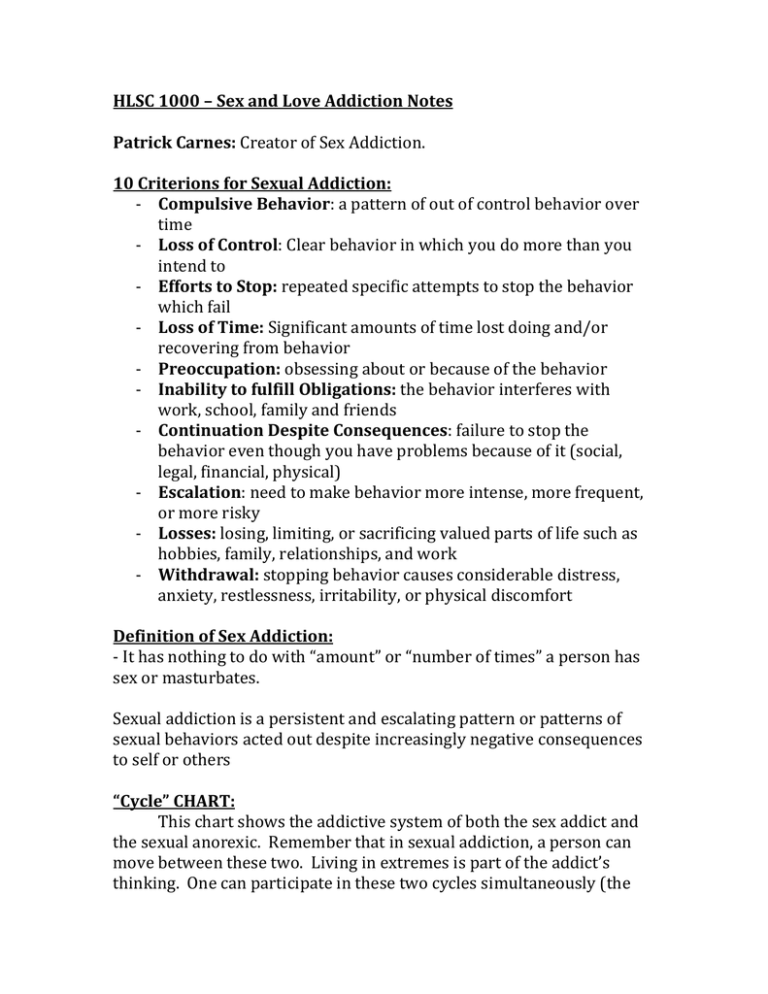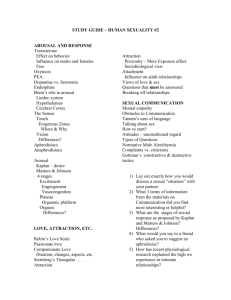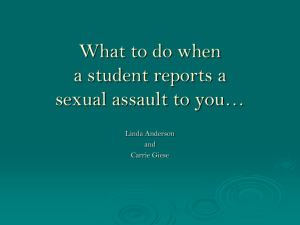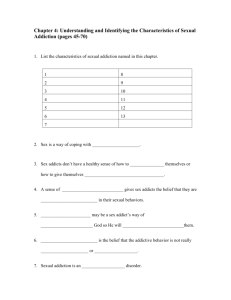
HLSC 1000 – Sex and Love Addiction Notes
Patrick Carnes: Creator of Sex Addiction.
10 Criterions for Sexual Addiction:
- Compulsive Behavior: a pattern of out of control behavior over
time
- Loss of Control: Clear behavior in which you do more than you
intend to
- Efforts to Stop: repeated specific attempts to stop the behavior
which fail
- Loss of Time: Significant amounts of time lost doing and/or
recovering from behavior
- Preoccupation: obsessing about or because of the behavior
- Inability to fulfill Obligations: the behavior interferes with
work, school, family and friends
- Continuation Despite Consequences: failure to stop the
behavior even though you have problems because of it (social,
legal, financial, physical)
- Escalation: need to make behavior more intense, more frequent,
or more risky
- Losses: losing, limiting, or sacrificing valued parts of life such as
hobbies, family, relationships, and work
- Withdrawal: stopping behavior causes considerable distress,
anxiety, restlessness, irritability, or physical discomfort
Definition of Sex Addiction:
- It has nothing to do with “amount” or “number of times” a person has
sex or masturbates.
Sexual addiction is a persistent and escalating pattern or patterns of
sexual behaviors acted out despite increasingly negative consequences
to self or others
“Cycle” CHART:
This chart shows the addictive system of both the sex addict and
the sexual anorexic. Remember that in sexual addiction, a person can
move between these two. Living in extremes is part of the addict’s
thinking. One can participate in these two cycles simultaneously (the
addict who is anorexic in their primary relationship, but has affairs or
the addict who has never had sexual intercourse but uses pornography
and masturbates compulsively).
BELIEF SYSTEM:
From these believes, we form a filter through which we look at the
world.
IMPAIRED THINKING
For the addict, their impaired thinking ignores reality, distorts reality,
and maybe even causes them to have no reality. Their interpretation is
so different from others and they use rationalizations for their addictive
behaviors. Each of the delusional thought processes (denial,
rationalizing, and blame) closes off an important avenue of selfknowledge and of reality for the sex addict, co-SA, and sexual anorexic.
The sex addict no longer takes in feedback that serves to correct their
faulty beliefs. The belief system fuels the impaired thinking which
moves the addict into the Addictive Cycle itself.
ADDICTIVE CYCLE
PREOCCUPATION:
The addictive cycle begins with preoccupation (thinking, fantasizing, a
trance, completely engrossed in something other than reality).
Misperceptions develop. The person finds themselves persistently
engrossed in thinking and fantasizing about acting out in their
addiction(s). The person cultivates a level of preoccupation as an
ongoing daily or hourly process, constantly trying to extend
preoccupation. The person becomes a hostage of their head. The
fantasy component accesses key neuro-pathways in the brain.
RITUALIATION:
Continue with addictive patterns, induce trance through ritual. All
addicts use ritual to alter their mood and keep their addictive behavior
going. The sex addict may keep going around the block numerous times
to see co-eds.
SEXUAL COMPULSIVITY:
Actual acting out
DESPAIR:
Despair is the utter hopelessness, sadness, desperation and fear that
addicts feel about their behavior. This is that “let down” feeling of
failure. This moves into the Shame and Blame Cycle.
SHAME/BLAME CYCLE: No addict wants to feel despair and
desperation that one more time they have acted out. To compensate,
they enter into the Shame/Blame Cycle. Shame is feeling we are at fault.
Blame is feeling others are at fault. The addict will return to
preoccupation to pull themselves out of their despair, shame and guilt
and being the Addictive Cycle anew. The person who experiences
unmanageability in their life
UNMANAGEABILITY:
Confirms beliefs about self and the overall Addictive System repeats
itself. Consequences may include: Loss of relationship, job, friends,
health, finances, and legal consequences. This proves our faulty belief
systems, which leads us back to impaired thinking and the Addictive
Cycle.
The Making of a Sex Addict:
The Family Component Rigid:
- Authoritarian leadership
- Strict discipline
- Roles seldom change
- Too little change
Chaotic:
- Lack of leadership
- Dramatic role shifts
- Erratic discipline
- Too much change
Sexual Behaviors: 10 types: “ Don’t call it Love”
Fantasy Sex:
Sexually charged fantasies, relationships and situations. Arousal
depends on sexual possibility
- Obsession and preoccupation is the way to prolong the feeling
- Can be heightened by masturbating or being in sexual
environments
- Orgasm or even sexual contact may destroy the obsession; better
to prolong
- Sexual contact with others may be avoided but sexual contact
with self is compulsive
- May act on a fantasy that isn’t true
- Observing or spying adds to the obsession of acting out
Seductive Role Sex:
Seduction of partners. Arousal is based on conquest and
diminishes rapidly after initial contact
- Arousal is a function of power and the maintenance of power as in
sexual harassment or affairs
- Arousal may become heightened by increasing risk/number or
partners
- Many relationships at a time or successive relationships
- Act out through affairs outside of marriage, hustles in single clubs,
health clubs or bars
- Using online to cultivate partners
- Using sex to find means of love or find partners they have
control over or are vulnerable
Voyeuristic Sex:
Visual arousal. The use of visual information to escape into
obsessive trance.
- Behaviors include pornography or photos, strip joints, watching
people with or without binoculars
- Hide downloaded material
- “Stash” always available
- May be heightened by masturbation, risk (peeping), violation of
boundaries (voyeuristic rape)-arousal maintained by visual.
Exhibitionistic Sex:
Attracting attention to body or sexual parts of the body. Sexual
arousal stems from reaction of viewer, whether shock or interest
Arousal may or may not be important
- Expose themselves in a public area
- May pretend they did not expose to others; masturbating in public
places to get caught
- Use the internet to expose themselves
- Sending photos to people who did not ask you.
Paying for Sex
Purchase of sexual services. Arousal is connected to payment for
sex and with time the arousal actually becomes connected to
money itself.
- Sexual activities vary
- But the process is about having
meanssearchpaymentpreferred acting outextreme
shame
- Use personal adds, massage parlors, pornography lines
- Spending money in order to have sex
Trading Sex:
Selling or bartering sex for power. Arousal is based on gaining
control of others by using sex as leverage
Prostitution, rather about the addict’s hooks up and can be a rush of
power
- Mutual sex may be unrewarding
- Make sexual videos which they may not be a part of
- Receive goods or money for sexual favors
- Often swap partners, encouraging partner to go outside of the
marriage for nudist camps or sex
- Swingers ads
Intrusive Sex:
Boundary violation without discovery. Sexual arousal occurs by
violating boundaries with no repercussions.
The high is about the violation with the orgasm being the second goal
- Frotteurism
- Arousal related to sexual contact without permission or
knowledge of the victim
- Sexualize conversations with inappropriate people (children,
workplace, acquaintances)
- Inappropriate sexual advances or gestures – sexual harassment
- Explicit phone lines to harass people
- Touch people sexually and pretend they didn’t mean too.
Anonymous Sex:
- No obligations; is often accelerated by unsafe or high risk
environments such as beach, parks, bathrooms, bars
- Spend a great deal of time cruising to find a partner
- Seek ultimate objectification by engaging with unknown partners;
regular partners or one night stands
- Sexualizes others in public spaces; locker rooms, public
bathrooms, showers
- Use the internet for risky encounters
- Travelling to meet others for sex
Pain Exchange Sex:
Being humiliated or hurt as part of sexual arousal; or sadistic
hurting or degrading another sexually, or both.
- Arousal fueled with pain and degradation or both
- Fantasy included; arousal built around narratives of humiliation
and shame
- Can also be voyeuristic
- Autoerotic: self inflicting pain
- Auto asphyxiation
- Based on fear
- May use sexual aides that are painful during masturbation
- Passive: giving up power and being willfully victimized in some
way
- Using chemicals to enhance pain exchange
- Internet sites which are abnormal, bizarre, and painful
Exploitive Sex:
Exploitation of the vulnerable. Arousal patterns are based on
target “types” of vulnerability
- Clients/patients, professionals, children, adolescents, or
distressed persons are the arousal
- Professional misconduct: perpetrators become aroused when
emotional pain is shared
- “Grooming” process: process of building trust in a potential victim
- Seek high risk situations: exploitive sex addicts cross the
boundaries of their victims by forcing sexual activity,
administering alcohol or drugs to victims, or using a position of
power
- Inappropriate sexual information shared with children or view
child pornography
STATISTICS:
Past: Sex addiction was seen as primarily a male problem
- There has been a shift; in patient treatment facilities report female
population has equaled and sometimes exceeded male clients
- Other large studies of Internet sex in which problematic cybersex
behavior by women was over (40%)
Male: “behaviors that objectify their partners and require little
emotional involvement” – anonymous sex, prostitution, pornography,
exhibitionism and frotteurism
Women: “behaviors that distort power – either in gaining control over
others or being a victim” – sexual conquest, working as prostitutes and
sadomasochism
However, more recently there has been a shift in women’s behavior.
There is an increase in “male” types behavior: pornography collections,
aggressiveness in approaching sexual partners, voyeurism
Love Addiction:
“Love addiction is an unhealthy dependency on the object of love. The
gradual enmeshment with the love object occurs over time and becomes
a soothing, satiating drug not unlike food and alcohol. Love addiction is
a form of passivity in that we do not directly resolve our own problems
or ask for what we need, but attempt to collude with others so they will
take care of us and keep life predictable. We take care of others at our
own emotional expense, or we attempt to control others to meet our needs
at their expense. No matter how it plays out, we look to others to fix our
fear, pain, and discomfort, and we tolerate or inflict abusive behaviors in
the process. Based on fear, rather than a bonding, it becomes a
psychological bondage” Brenda Schaeffer
Addictive love is an unconscious attempt to satisfy our human hunger
for security, sensation, power, identity, belonging, and meaning. It is
very often associated with feelings of never having enough or not being
enough.




